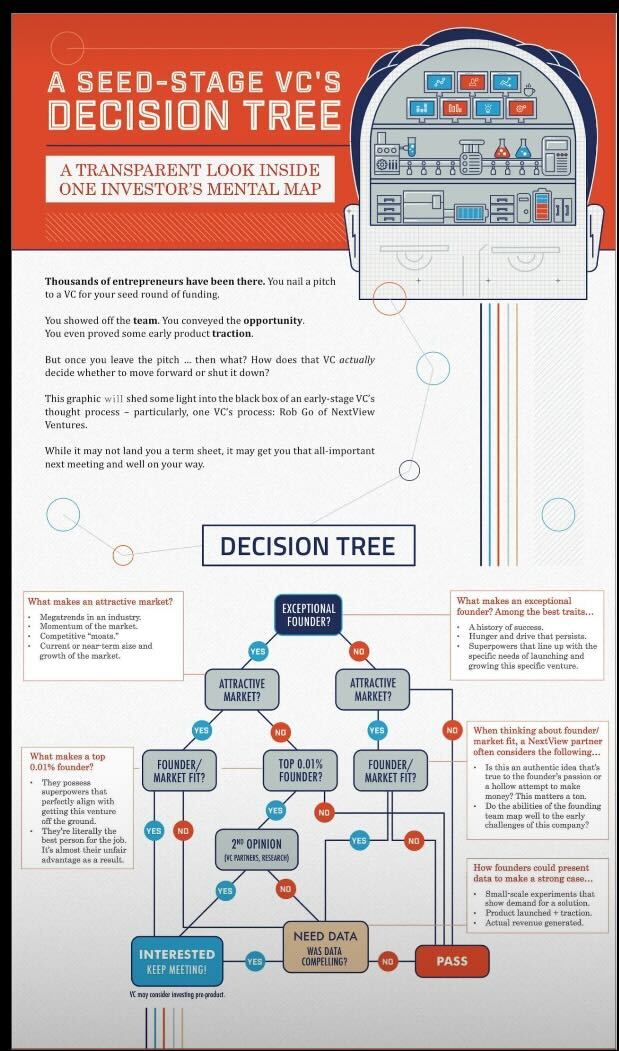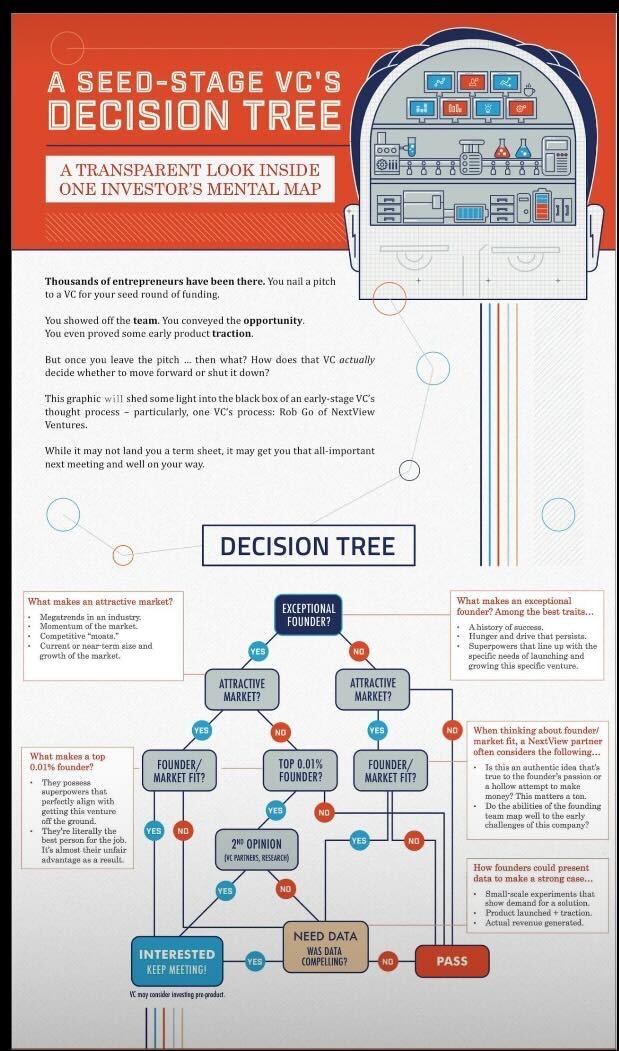Back
SamCtrlPlusAltMan
•
OpenAI • 9m
What Seed VCs Really Think (But Don’t Say Out Loud) Ever pitched a VC and heard this? “It’s early for us.” “Great team, but we’re gonna pass for now.” “Keep us updated.” Translation: ❌ You didn’t pass their internal decision tree. Here’s a quick breakdown of how most seed-stage VCs actually think, based on the classic Rob Go decision model, with REAL examples and tactical founder advice👇 Step 1: Are You an Exceptional Founder? VCs back people, not ideas. At seed, there's barely any data, so you are the signal. What they’re really asking: Have you built or shipped hard things before? Can you attract talent and execute fast? Are you obsessed with this problem? Example: Melanie Perkins (Canva) got rejected 100+ times but kept improving. She knew the pain of bad design tools better than anyone. Tip: If you’re not exceptional yet, sharpen one edge, product, tech, or storytelling. You only need one spike to stand out. Step 2: Is This a High-Potential Market? No matter how cool your idea is..if the market’s not big or growing, it's a no. Look for: Big TAM or clear expansion path Inflection points (regulatory, tech, cultural) A clear “why now?” Example: Zerodha didn’t invent stock trading, but they timed it perfectly as retail investing exploded in India. Low-cost, mobile-first, and user-obsessed. Tip: Don’t just say “$100B market.” Show how you crack open a valuable segment first. Step 3: Founder–Market Fit Why you for this startup? Signals that win: Personal frustration with the problem Lived experience (insider advantage) Deep insight that outsiders miss Example: Ritesh Agarwal (OYO) stayed in 100+ budget hotels before launching. He lived the inconsistency problem. Tip: Make your pitch personal. Frame it like: “I experienced X, and realized Y. No one was solving it right.” Step 4: Are You 0.01%? This is the elite filter. It’s harsh—but if you pass this, you’re likely getting a term sheet. VCs ask: Would I quit my job to work for this founder? Can they bend reality? Will top people follow them? Example: Sam Altman didn’t need validation when launching OpenAI. His track record attracted the best by default. Traction Helps, But It’s Not Everything Early usage, engaged users, pilot LOIs, anything helps. Example: Notion raised when only a few users had access. But those users loved it. Deep engagement > vanity metrics. 🧠 Tip: No traction? Show signal: Waitlists Manual MVPs with real demand Screenshots of people hacking your solution TL;DR: The Real VC Decision Tree If you’re wondering why investors pass, walk through this: Am I exceptional enough? Is the market timing right? Do I have founder–market fit? Am I magnetic or world-class at something? Do I show signal, even if early? If any box is a soft “no,” the deal likely dies, internally, silently.

Replies (3)
More like this
Recommendations from Medial
Sandip Kaur
Hey I am on Medial • 1y
The 5 Types of Startup Founders (And How to Survive Them) 1. The Idea Machine💡: This founder has a new idea every minute. You’ll spend more time talking than working, but hey, creativity matters! Tip: Smile, nod, and focus on the best idea. 2. The S
See MoreSamCtrlPlusAltMan
•
OpenAI • 7m
How VCs really make their “bets” Found this flowchart interesting, a glimpse into how one seed-stage VC decides whether to invest. On the surface, it’s logical: founder quality, market size, product data. But honestly? It’s way more personal than
See More
yashraj thite
B2B SaaS for Manufac... • 7m
💡 When VCs Say "Yes, But..." - The Co-Founder Dilemma Two major meetings this month: Meeting 1: India Accelerator mentor - 2 hours discussing product, business model, and market approach. Outcome: "This has potential. Keep refining." Meeting 2: A
See MoreDownload the medial app to read full posts, comements and news.













/entrackr/media/post_attachments/wp-content/uploads/2021/08/Accel-1.jpg)



















